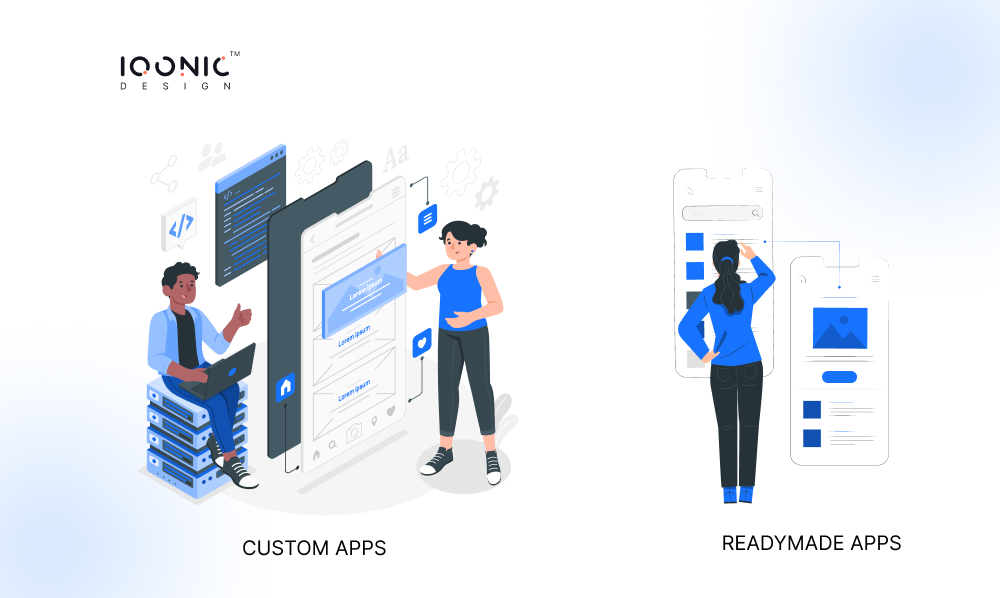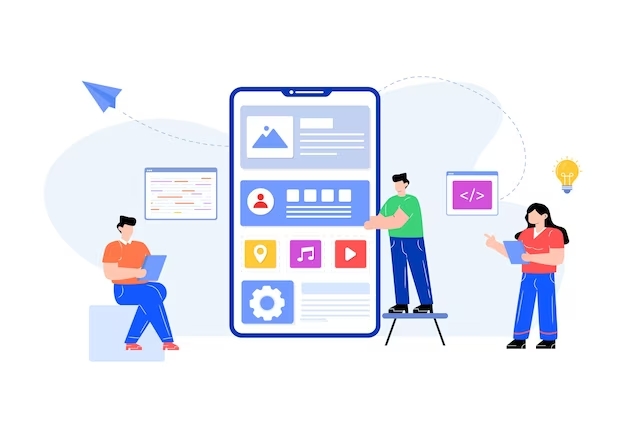
7 Things to Consider When Choosing Between Readymade and Custom Apps
In a world increasingly reliant on technology, mobile applications have become an integral part of our daily lives. From ordering food to managing finances, there is an app for everything. This surge in demand for mobile apps has sparked a crucial decision for businesses and individuals: should you opt for a ready-made app or invest in a custom-built solution? The answer to this question carries significant weight, as it can impact efficiency, cost, and success.
The purpose of this blog is to shed light on the seven key factors that should guide your decision-making process when choosing between ready-made and custom apps. We’ll explore the advantages and disadvantages of both options, providing real-world examples to illustrate their impact. By the end of this blog, you’ll be well-equipped to make an informed choice that aligns with your unique needs and goals.
Let’s dive into the world of mobile apps and uncover the essential considerations that will steer you toward the right path.
Definition of Readymade and Custom Apps
Ready-made apps, or off-the-shelf apps, are pre-built software solutions available for immediate use. They come with standard features and are designed to address common needs. In contrast, custom apps are tailor-made applications created to meet specific requirements. They are unique to each user and can be customized to fit precise business processes.
The fundamental difference between these two lies in personalization. Ready-made apps offer speed and affordability but may lack the customization for unique tasks. On the other hand, custom apps provide flexibility but often require more time and investment. Your choice depends on your specific goals and the nature of your operations.
Advantages and Disadvantages of Readymade Apps

Ready-made apps have their advantages. They are cost-effective because you don’t need to build them from scratch. Deployment is speedy, allowing quick access to essential functionalities. However, these apps may not fully align with your distinct business processes. They often have limited customization options, making it challenging to adapt them to unique needs. Additionally, you might depend on the app provider’s updates and support.
Advantages and Disadvantages of Custom Apps

Custom apps offer tailored functionality, precisely meeting your business needs. They empower you to stand out in the market with unique features, providing a competitive edge. However, developing custom apps usually takes longer than using ready-made solutions. The extended development timeline can be a drawback when you need a quick solution.
The advantages include scalability, as custom apps can grow with your business. You control updates and can ensure they align with your changing requirements. On the downside, custom apps typically require a higher initial investment than readymade apps.
Considerations for Choosing Between Readymade and Custom Apps
1. Budget:
If you have budget constraints, ready-made apps are cost-effective. For example, small businesses often opt for ready-to-use accounting software like QuickBooks.
2. Business Needs:
Assess your specific needs. If you need unique features like Airbnb’s custom booking system, custom apps might be the way to go.
3. Scalability:
Custom apps, as seen with Facebook’s continuous growth and feature updates, allow scalability.
4. Development Time:
Consider the urgency. In critical situations, like during the pandemic, ready-made video conferencing apps like Zoom were a quick solution.
5. Support and Updates:
Custom apps provide control over updates, but for essential software like antivirus, regular readymade updates are crucial.
6. User Experience:
Prioritize user experience. Netflix’s custom recommendation algorithms make it a user-centric platform.
7. Competitive Edge:
Analyze the market. Uber’s custom ride-hailing app gave them an edge by offering something distinct.
Case Studies or Examples
Case Study 1: WhatsApp and Customization
WhatsApp, a custom messaging app, adapted to user needs by introducing voice and video calling. They closely analyzed user behavior and trends, providing features aligned with communication preferences. Their strategy focused on frequent updates and user feedback, resulting in a user base of over 2 billion people.
Case Study 2: Spotify and the Value of Readymade Apps
Spotify, a ready-made music streaming app, leveraged speed. They quickly entered the market, offering a vast music library. Spotify’s strategy was to provide an accessible, user-friendly platform with a wide selection of songs. This approach made them a leader in the music streaming industry, with over 345 million users.
Conclusion and Final Recommendations
In conclusion, choosing ready-made and custom apps is pivotal for your business. Custom apps offer tailored solutions, but they come with longer development timelines and potentially higher costs. Ready-made apps are speedy and cost-effective but may lack unique features.
Recommendations:
1. Choose Custom for Uniqueness:
Opt for custom apps when your business needs unique features or personalized user experiences.
2. Speed and Budget:
For quicker solutions with budget constraints, go for ready-made apps.
3. Consider Market Trends:
Analyze market trends to stay competitive.
4. User Feedback:
Listen and adapt your app accordingly.
5. Combine Both:
Sometimes, a hybrid approach, like integrating ready-made apps with custom modules, can be the best solution.
Make an informed decision, aligning your choice with your goals and resources.






